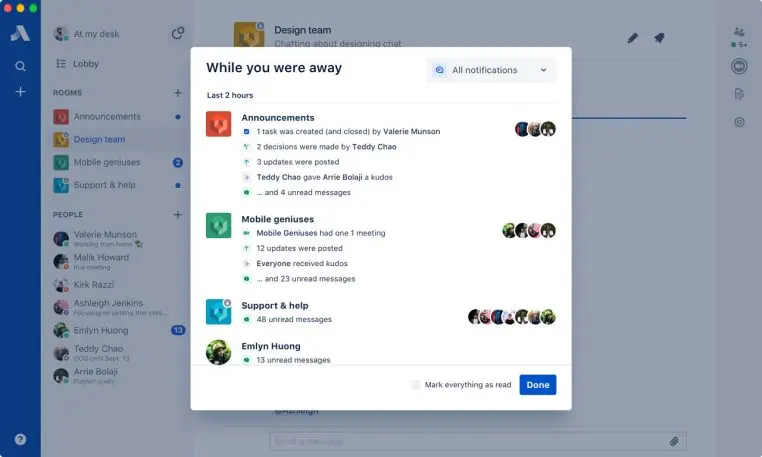A new contender in the fight for your workplace chat conversations launches today, and it’s made by some of the same people that built one of the other major players in the space. Atlassian, the company behind the popular program HipChat, is launching Stride, a complete mobile and desktop team solution that can handle chats similar to HipChat and Slack, but it also supports video chatting and collaboration in an attempt to make your workday much more productive.
“The reason why we built a whole new product is there was nothing to acquire, nothing existed in this space,” says Steve Goldsmith, Stride’s general manager, who was formerly general manager for HipChat. He says that while there are companies that handle things like video and chat, or document collaboration and video, they typically started out as one single product and then sort of tacked on one another, which doesn’t really mesh with the original product’s vision and turns into a distraction.
“We thought it was really important to step back and build something end-to-end that actually solves all these problems as one thing instead of bolting together parts that may or may not tie together,” Goldsmith says.
Stride isn’t replacing HipChat, but existing HipChat customers can opt to migrate over to the new platform if they’d like. If so, Atlassian promises to ensure all their HipChat history and data comes along with them.
Messaging in Stride [Image: courtesy Atlassian]
Better Meetings
Meetings is one of the domains where Stride shines. If you’re having a text chat in a room within Stride and decide you need a meeting to discuss things further, you can literally start one right there. You can choose to invite only members of the room or extend the meeting invite out to other members of your organization, including those who aren’t using Stride and want to dial in using their phone. Both dial-in and out work within the platform and involve just typing in a phone number.
Once you have that meeting, you can set Actions and Decisions within it. These can really be done anywhere—you don’t have to be in a meeting—and function like @ messages on steroids. Rather than getting thrown into the fray with all the other messages in the room, they’re placed out in the sidebar where you can quickly access them.
That design also makes information easier to find when you’re out of the office for a few days, or just happen to be at lunch or in another meeting when a decision is made. Rather than sorting through everything you missed to find the things that pertain to you, those bits are highlighted. It’s similar to how Slack allows you to look at just your notifications or threads, except more customized to you.
Out-Of-Office Made Easy
A number of other features are useful when you’re out of the office. Rather than just setting an “away” message when you head into a meeting or need to go heads down to finish a project, for instance, Stride allows you to set a timer on that out-of-office message. Called Focus Mode, you might, for instance, set the timer for two hours with a note that you’re working on a big proposal.

All those notifications are delivered in a summary of everything that happened across all of the different rooms you’re a part of. That means you can quickly pinpoint what needs your attention, and what you can ignore—a huge plus if you have teams in different time zones, and going home for the night means missing a lot of activity. A button on that summary screen lets you mark all your missed notifications as read, and you can continue about your day.
Atlassian will be slowly rolling Stride out to its current HipChat customers before opening the product up to the public. The product is free to use for an unlimited number of users and includes video and audio chat functionality, instant messaging, secure file bots (Atlassian will make sure you can read a shared file even if you don’t have the required program on your computer), and message history file storage. File storage is limited to 25,000 messages for the free version; the standard paid version, which costs $3 per month per user, offers unlimited messaging.
Recognize your company's culture of innovation by applying to this year's Best Workplaces for Innovators Awards before the extended deadline, April 12.